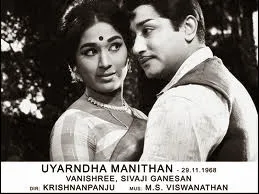The Lunch Box (Hindi, English; 2013)
 Every now and then, you have a short and sweet gem from the Indian subcontinent, and this is it. They introduced the dabbawalla system to the world and infused love into it when delivery is wrongly sent.
Every now and then, you have a short and sweet gem from the Indian subcontinent, and this is it. They introduced the dabbawalla system to the world and infused love into it when delivery is wrongly sent.
Just to get the basics right, the dabbawallah system was started in 1890 to feed lunch the office workers in Mumbai. Over the years, it has gained its popularity and is responsible for feeding 200,000 mouths daily using about 5,000 workers. Its business model is envied even by the biggest of the business minds and is said to have an error of 1 in 6 million! Since its inception, the workers had not missed even a day of supply despite the roughest of the monsoon weather, barring the day when the workers decided to march in support Anna Hazare's fast against corruption.
The layout is simple. A near retirement Government office worker, Saajan Fernandez, a widower, get his usual lunch in a tiffin. By mistake, the lunch box from Ila goes to his table. His gustatory receptors are left spellbound, and he decides to thank via a short note.
Realising that it is not her husband, who is cold towards her, who is not tasting her sumptuous preparations, the bored housewife Ila reciprocates. Hence starts an exciting affair...
The love blossoms in a dignified manner. Ila, whose effort of winning her husband's heart seems to hit a brick wall. She does her dutiful chores like cooking, cleaning and manning her schooling child but the husband is cold. She later finds out that he has an affair.
Saanjan leads a mundane life checking accounts in his office and goes back to an empty house loaded with memories of his wife. The correspondence reignites Saajan's ordinary life and leaves him feeling good.
 This note sharing invokes a kind of feeling akin to teenagers experiencing their first love, frequently looking out for tiffin man to come with the container and its letter. It reminded me of Fred Savage in the 80s sitcom 'The Wonder Years'.
This note sharing invokes a kind of feeling akin to teenagers experiencing their first love, frequently looking out for tiffin man to come with the container and its letter. It reminded me of Fred Savage in the 80s sitcom 'The Wonder Years'.
It also takes the viewers through the busy streets of Mumbai to come close and personal with Mumbaites and Dabbawallas.
There is an interesting character in Saajan's assistant. The relationship stimulates each other's routine.

The best scene in the film, in my opinion, is when they decide to meet up. Saajan felt that he needed to shave his beard. At the washroom, his olfactory senses started playing tricks on him. He smelt his dead grandfather's scent.

When he saw himself in the mirror, he realised that he was not a spring chicken anymore. He chickened out and decided to let Ila be stood up. Meanwhile, he was peeking from a corner, seeing her fidgety. In the letter the following day, he advised her not to waste her time on him as she was young and had a dream to fulfil. Irrfan Khan gave a good performance with a simple depiction of a small man in a big world with modest ambitions.
The story is intentionally left hanging at the end to give it the arty feel!
(P.S. The story may not be your cup of tea to the beholders of morality. The idea of a mother a preteen engaging in an extramarital affair based on a few notes received in the tiffin carrier and when wronged by the husband may not go well with you. Stay away. May ring a reminder to those with that cheeky intent inside and still live in a dream to find perfect love and still believe in Santa Claus.)
 Every now and then, you have a short and sweet gem from the Indian subcontinent, and this is it. They introduced the dabbawalla system to the world and infused love into it when delivery is wrongly sent.
Every now and then, you have a short and sweet gem from the Indian subcontinent, and this is it. They introduced the dabbawalla system to the world and infused love into it when delivery is wrongly sent.Just to get the basics right, the dabbawallah system was started in 1890 to feed lunch the office workers in Mumbai. Over the years, it has gained its popularity and is responsible for feeding 200,000 mouths daily using about 5,000 workers. Its business model is envied even by the biggest of the business minds and is said to have an error of 1 in 6 million! Since its inception, the workers had not missed even a day of supply despite the roughest of the monsoon weather, barring the day when the workers decided to march in support Anna Hazare's fast against corruption.
The layout is simple. A near retirement Government office worker, Saajan Fernandez, a widower, get his usual lunch in a tiffin. By mistake, the lunch box from Ila goes to his table. His gustatory receptors are left spellbound, and he decides to thank via a short note.
 |
| Mumbai Dabbawallas! |
The love blossoms in a dignified manner. Ila, whose effort of winning her husband's heart seems to hit a brick wall. She does her dutiful chores like cooking, cleaning and manning her schooling child but the husband is cold. She later finds out that he has an affair.
Saanjan leads a mundane life checking accounts in his office and goes back to an empty house loaded with memories of his wife. The correspondence reignites Saajan's ordinary life and leaves him feeling good.
 This note sharing invokes a kind of feeling akin to teenagers experiencing their first love, frequently looking out for tiffin man to come with the container and its letter. It reminded me of Fred Savage in the 80s sitcom 'The Wonder Years'.
This note sharing invokes a kind of feeling akin to teenagers experiencing their first love, frequently looking out for tiffin man to come with the container and its letter. It reminded me of Fred Savage in the 80s sitcom 'The Wonder Years'.It also takes the viewers through the busy streets of Mumbai to come close and personal with Mumbaites and Dabbawallas.
There is an interesting character in Saajan's assistant. The relationship stimulates each other's routine.

The best scene in the film, in my opinion, is when they decide to meet up. Saajan felt that he needed to shave his beard. At the washroom, his olfactory senses started playing tricks on him. He smelt his dead grandfather's scent.

When he saw himself in the mirror, he realised that he was not a spring chicken anymore. He chickened out and decided to let Ila be stood up. Meanwhile, he was peeking from a corner, seeing her fidgety. In the letter the following day, he advised her not to waste her time on him as she was young and had a dream to fulfil. Irrfan Khan gave a good performance with a simple depiction of a small man in a big world with modest ambitions.
The story is intentionally left hanging at the end to give it the arty feel!
(P.S. The story may not be your cup of tea to the beholders of morality. The idea of a mother a preteen engaging in an extramarital affair based on a few notes received in the tiffin carrier and when wronged by the husband may not go well with you. Stay away. May ring a reminder to those with that cheeky intent inside and still live in a dream to find perfect love and still believe in Santa Claus.)
















